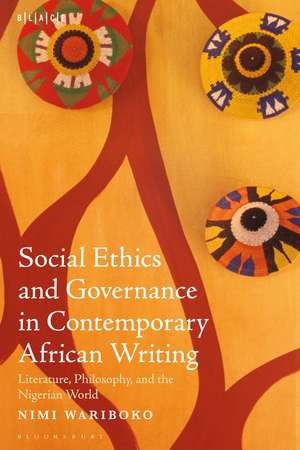Social Ethics and Governance in Contemporary African Writing: Literature, Philosophy, and the Nigerian World: Black Literary and Cultural Expressions
Autor Dr. or Prof. Nimi Waribokoen Limba Engleză Paperback – 11 ian 2023
| Toate formatele și edițiile | Preț | Express |
|---|---|---|
| Paperback (1) | 123.53 lei 22-36 zile | +27.42 lei 6-12 zile |
| Bloomsbury Publishing – 11 ian 2023 | 123.53 lei 22-36 zile | +27.42 lei 6-12 zile |
| Hardback (1) | 345.67 lei 43-57 zile | |
| Bloomsbury Publishing – 11 ian 2023 | 345.67 lei 43-57 zile |
Preț: 123.53 lei
Preț vechi: 132.25 lei
-7% Nou
Puncte Express: 185
Preț estimativ în valută:
23.64€ • 24.59$ • 19.52£
23.64€ • 24.59$ • 19.52£
Carte disponibilă
Livrare economică 24 martie-07 aprilie
Livrare express 08-14 martie pentru 37.41 lei
Preluare comenzi: 021 569.72.76
Specificații
ISBN-13: 9781501398070
ISBN-10: 1501398075
Pagini: 208
Dimensiuni: 152 x 229 x 18 mm
Greutate: 0.45 kg
Editura: Bloomsbury Publishing
Colecția Bloomsbury Academic
Seria Black Literary and Cultural Expressions
Locul publicării:New York, United States
ISBN-10: 1501398075
Pagini: 208
Dimensiuni: 152 x 229 x 18 mm
Greutate: 0.45 kg
Editura: Bloomsbury Publishing
Colecția Bloomsbury Academic
Seria Black Literary and Cultural Expressions
Locul publicării:New York, United States
Caracteristici
Considers the role literature can play in democratic politics and in shaping social ethics in any modern society, constructing a radical political philosophy from Nigerian literature
Notă biografică
Nimi Wariboko is Walter G. Muelder Professor of Social Ethics at Boston University, USA. His recent books include Ethics and Society in Nigeria: Identity, History, Political Theory (2019) and Methods of Ethical Analysis: Between Theology, History and Literature (2013).
Cuprins
AcknowledgmentsIntroduction: Hear Word-Literature Is Philosophy1. Theoretical Hesitations: Ibadan Brown Roofs' Rusty Revival of Desires2. The Black Moon on the White Surface: A Philosophical Analysis of A. Igoni Barrett's Blackass3. Bad Governance and Postcoloniality: Literature as Cultural Criticism4. From Executed God to Ozidi Saga: Ethos of Ijo Democratic Republicanism5. Comedy as Dialectics: Laughing Nigeria to Human Flourishing6. Literature as EthicsBibliography
Recenzii
In this highly original work, social ethicist Nimi Wariboko steps off Aristotle's insight that literature can be an excellent tool for teaching ethics and developing moral imagination to interrogate the works of four Nigerian writers and one comedian, instructing how the intersection of philosophy and literature can teach invaluable lessons on imagining an ethical, pluralistic, and democratic society in Nigeria. Incisively brilliant and beautifully written, this is a must read.
In this influential book, Nimi Wariboko brilliantly and thoughtfully reflects on the ethics of governance and development in a post-colonial space. By employing secondary data and critical analysis, he adopts his diverse disciplinary perspectives and mastery to deeply interrogate ethical and governance issues that post-colonial states in Africa continue to grapple with. This book also deeply speaks to ethical, moral, and historical dilemmas facing governance and democracy, and it is a must read for anyone interested in social ethics and governance in post-colonial Africa.
In this influential book, Nimi Wariboko brilliantly and thoughtfully reflects on the ethics of governance and development in a post-colonial space. By employing secondary data and critical analysis, he adopts his diverse disciplinary perspectives and mastery to deeply interrogate ethical and governance issues that post-colonial states in Africa continue to grapple with. This book also deeply speaks to ethical, moral, and historical dilemmas facing governance and democracy, and it is a must read for anyone interested in social ethics and governance in post-colonial Africa.




